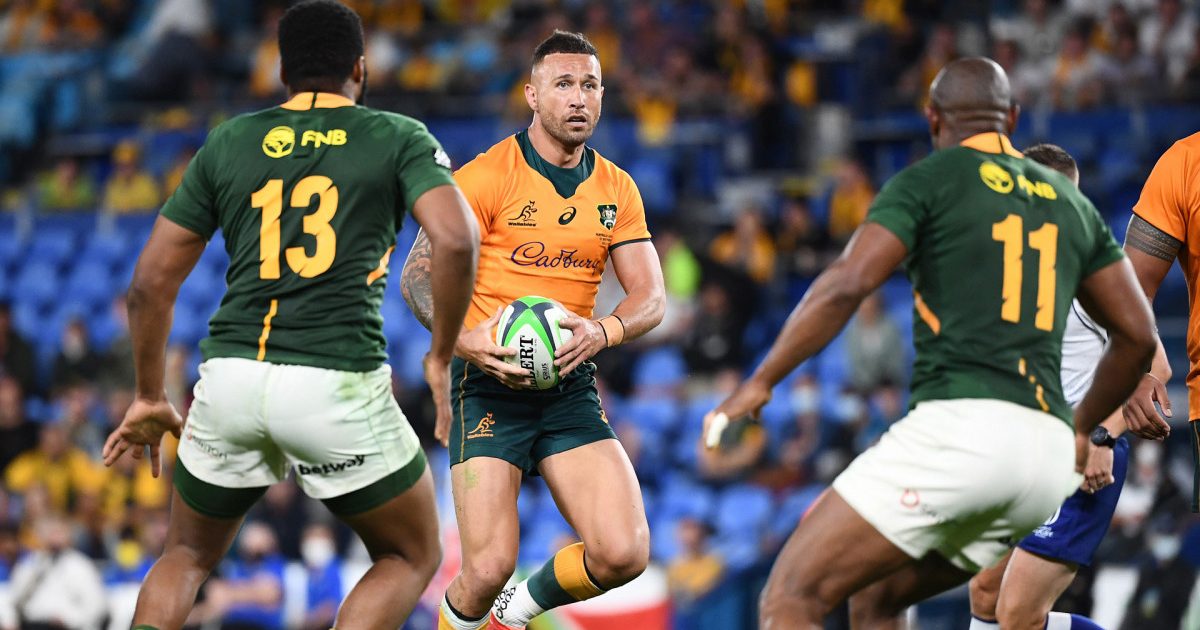The rebirth of Cooper is what Wallabies needed but it won't erase the past

The pride of Tokoroa is back.
Maybe now, after piloting the Wallabies to an upset victory over the Springboks, they will fast-track that Australian citizenship for Quade Cooper, hitherto that mercurial No 10.
In his first test match in four years, he kicked eight from eight off the tee and didn’t make a mistake all night. It seems like, at the age of 33, he has found the maturity to his rugby that Robbie Deans and Brad Thorn could not see.
Funnily enough, I’m in agreement with Sonny Bill Williams. Dave Rennie should have taken the gamble and reintroduced him against the All Blacks in either Bledisloe II or III.
Noah Lolesio kicked like a metronome against France in July but he was badly astray off the tee in the first Auckland Bledisloe and just looked like a rookie provincial player in Perth. He may be the future but international rugby is about the results of the here and now.
Cooper would not have won the Bledisloe but he would have likely, despite his ragged history against the All Blacks, given the side much-needed guidance and execution around their option-taking.
James O’Connor, of course, would have been the man to drive the Wallabies around the park were it not or injury. He too, like Cooper, is another mercurial talent who just looks calm and at peace with himself now. O’Connor appeals as the man to lead the Wallabies to Rugby World Cup 2023.
It was fascinating to watch Cooper closely on Sunday night. He was so at ease that he did a TV interview 30 minutes before kickoff. He did not overplay his hand during the match. We know he still passes well of either hand and he flicked a pressure ball to Samu Kerevi which set in chain the Wallabies’ sole try.
ADVERTISEMENT
View this post on Instagram
Naturally he is not going to be making searing breaks with his dazzling footwork as he did a decade ago. But he took the ball to the line and gave the ball at the right time. However, his tactical kicking was not flash. There was, it must be said, altogether too much kicking from both teams.
But who would have picked that Australia would win the test on goal kicking, having conceded three tries to one? Granted, the Boks did score their trio of tries in time-honoured fashion, but they also missed four shots at goal, centre Lukhanyo Am somehow bombed a try when over the line and they never really settled against a committed Wallaby pack.
This could be partially attributable to two weeks in quarantine, but the Boks have never really respected the Wallabies, not like they do the All Blacks.
Speaking of respect, Cooper has always struggled for universal, or even partial, admiration from rugby people in his homeland. With some justification.
It was put to me years ago by a senior Kiwi rugby journalist that Cooper was a once in a generation player. Nonsense. Dan Carter is a once in a generation player. Cooper was a very talented Super Rugby player who occasionally shone in the international game. He rarely, if ever, marked up against the All Blacks in 12 outings.
Hell, Carlos Spencer, who played half as many tests, was a better international footballer than Cooper. But Spencer, too, endured some tough moments at the top and will never be tagged a great All Black.
You don’t get feisty with Richie McCaw and expect respect from the New Zealand public unless you can back it up on the field. That’s why Kiwis don’t care that Martin Johnson woodened Justin Marshall in 1997. Johnno earned respect for his play and leadership under pressure and against the All Blacks.
Cooper, for all his bravado, never played well against the All Blacks. It wasn’t just his flighty defence. It was a lack of mental toughness. Erase those games from his CV and he would rate as a fine international. But, alas, we cannot.
Cooper himself won’t care what we think. He admits that footy is now just “a small part of my life.”
The good news is that the Wallabies do not play the All Blacks again this year. So Cooper has the opportunity to shine again, outside Tate McDermott and inside Samu Kerevi.
This is his rebirth. He has shown his mettle and good on him. But he will not suddenly go down as a Wallaby great, fit to rank alongside messrs Ella. Larkham and Lynagh, on one cool-headed display.





































































